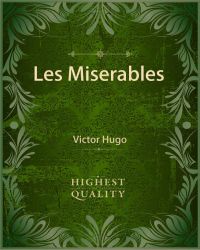CHAPTER II
您可以在百度里搜索“Les Miserables 艾草文学(www.321553.xyz)”查找最新章节!
AN OWL'S VIEW OF PARIS
A being who could have hovered over Paris that night with the wing of the bat or the owl would have had beneath his eyes a gloomy spectacle.
All that old quarter of the Halles, which is like a city within a city, through which run the Rues Saint Denis and Saint Martin, where a thousand lanes cross, and of which the insurgents had made their redoubt and their stronghold, would have appeared to him like a dark and enormous cavity hollowed out in the centre of Paris. There the glance fell into an abyss. Thanks to the broken lanterns, thanks to the closed windows, there all radiance, all life, all sound, all movement ceased.
The invisible police of the insurrection were on the watch everywhere, and maintained order, that is to say, night.
The necessary tactics of insurrection are to drown small numbers in a vast obscurity, to multiply every combatant by the possibilities which that obscurity contains. At dusk, every window where a candle was burning received a shot.
The light was extinguished, sometimes the inhabitant was killed. Hence nothing was stirring. There was nothing but fright, mourning, stupor in the houses;
and in the streets, a sort of sacred horror. Not even the long rows of windows and stores, the indentations of the chimneys, and the roofs, and the vague reflections which are cast back by the wet and muddy pavements, were visible. An eye cast upward at that mass of shadows might, perhaps, have caught a glimpse here and there, at intervals, of indistinct gleams which brought out broken and eccentric lines, and profiles of singular buildings, something like the lights which go and come in ruins;
it was at such points that the barricades were situated.
The rest was a lake of obscurity, foggy, heavy, and funereal, above which, in motionless and melancholy outlines, rose the tower of Saint Jacques, the church of Saint Merry, and two or three more of those grand edifices of which man makes giants and the night makes phantoms.
All around this deserted and disquieting labyrinth, in the quarters where the Parisian circulation had not been annihilated, and where a few street lanterns still burned, the aerial observer might have distinguished the metallic gleam of swords and bayonets, the dull rumble of artillery, and the swarming of silent battalions whose ranks were swelling from minute to minute;
a formidable girdle which was slowly drawing in and around the insurrection.
The invested quarter was no longer anything more than a monstrous cavern;
everything there appeared to be asleep or motionless, and, as we have just seen, any street which one might come to offered nothing but darkness.
A wild darkness, full of traps, full of unseen and formidable shocks, into which it was alarming to penetrate, and in which it was terrible to remain, where those who entered shivered before those whom they awaited, where those who waited shuddered before those who were coming. Invisible combatants were entrenched at every corner of the street;
snares of the sepulchre concealed in the density of night. All was over. No more light was to be hoped for, henceforth, except the lightning of guns, no further encounter except the abrupt and rapid apparition of death. Where? How? When? No one knew, but it was certain and inevitable.
In this place which had been marked out for the struggle, the Government and the insurrection, the National Guard, and popular societies, the bourgeois and the uprising, groping their way, were about to come into contact.
The necessity was the same for both.
The only possible issue thenceforth was to emerge thence killed or conquerors. A situation so extreme, an obscurity so powerful, that the most timid felt themselves seized with resolution, and the most daring with terror.
Moreover, on both sides, the fury, the rage, and the determination were equal. For the one party, to advance meant death, and no one dreamed of retreating;
for the other, to remain meant death, and no one dreamed of flight.
It was indispensable that all should be ended on the following day, that triumph should rest either here or there, that the insurrection should prove itself a revolution or a skirmish.
The Government understood this as well as the parties;
the most insignificant bourgeois felt it. Hence a thought of anguish which mingled with the impenetrable gloom of this quarter where all was at the point of being decided;
hence a redoubled anxiety around that silence whence a catastrophe was on the point of emerging. Here only one sound was audible, a sound as heart rending as the death rattle, as menacing as a malediction, the tocsin of Saint Merry. Nothing could be more blood curdling than the clamor of that wild and desperate bell, wailing amid the shadows.
As it often happens, nature seemed to have fallen into accord with what men were about to do. Nothing disturbed the harmony of the whole effect.
The stars had disappeared, heavy clouds filled the horizon with their melancholy folds. A black sky rested on these dead streets, as though an immense winding sheet were being outspread over this immense tomb.
While a battle that was still wholly political was in preparation in the same locality which had already witnessed so many revolutionary events, while youth, the secret associations, the schools, in the name of principles, and the middle classes, in the name of interests, were approaching preparatory to dashing themselves together, clasping and throwing each other, while each one hastened and invited the last and decisive hour of the crisis, far away and quite outside of this fatal quarter, in the most profound depths of the unfathomable cavities of that wretched old Paris which disappears under the splendor of happy and opulent Paris, the sombre voice of the people could be heard giving utterance to a dull roar.
A fearful and sacred voice which is composed of the roar of the brute and of the word of God, which terrifies the weak and which warns the wise, which comes both from below like the voice of the lion, and from on high like the voice of the thunder. Les Miserables

